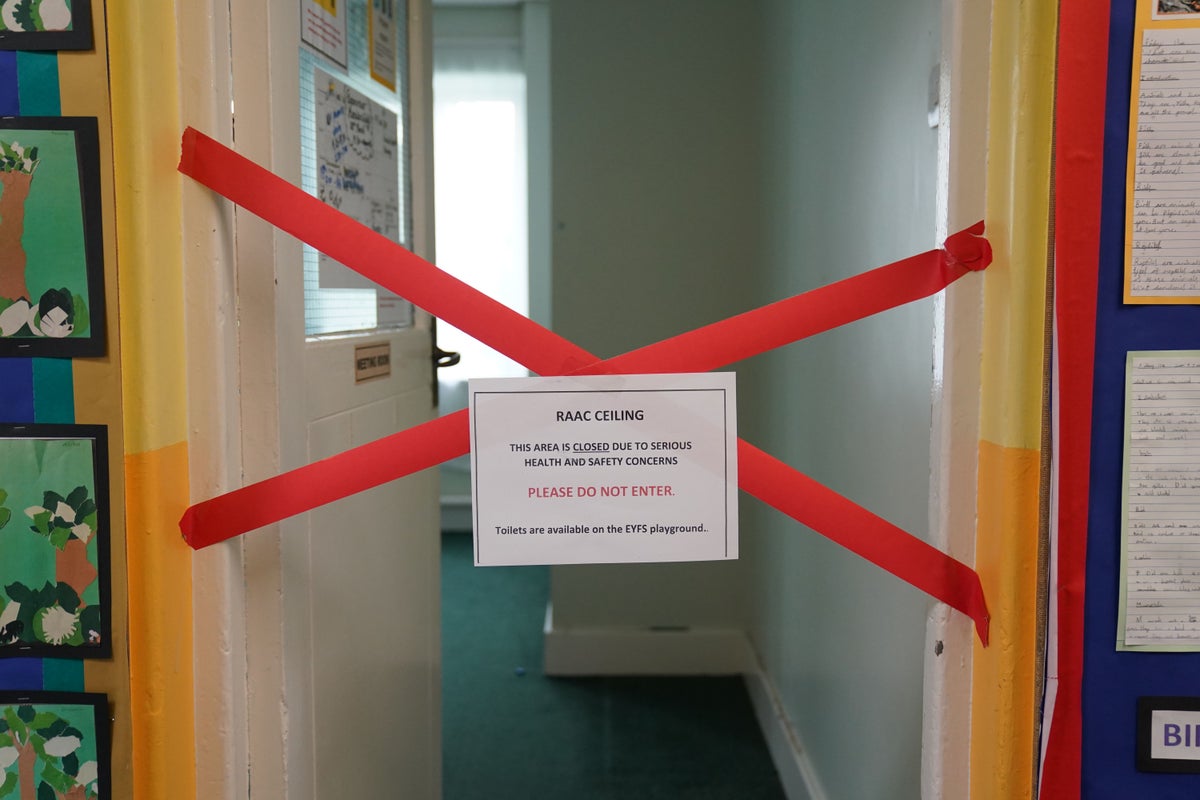
A government report flags the risk to schools from earthquakes but fails to raise the alarm over collapsing buildings despite concerns about crumbling concrete dating back nearly three decades.
The 2023 report, which identifies national risks, also warns that schools could face disruption from a loss of drinking water, high and low temperatures and snow but makes no reference to the dangers from potentially structurally unsound buildings.
The Liberal Democrats accused the government of being “blindsided” by the scandal surrounding reinforced autoclaved aerated concrete (Raac) while preparing for the “most unlikely of scenarios”.
It comes after more than 100 schools across England were forced to close or partially shut this week due to the potential risk from Raac, plunging the new term into chaos.
Raac is a less durable form of concrete, which has a lifespan of around 30 years and is prone to collapse when it gets wet. Concerns about its structural integrity were first raised by researchers in 1994.
On Wednesday, the government published a full list of the 147 schools containing Raac, although the number is expected to swell as more surveys are carried out in institutions up and down the country.
Prime Minister Rishi Sunak has conceded that “hundreds” more schools are likely to contain the material and it has also been found in hospitals, courts and a shopping centre. There are fears it could affect thousands of other public buildings such as offices, police stations, prisons and defence buildings.
General view of Park View School in London, which has been affected with sub standard reinforced autoclaved aerated concrete (Raac). Picture date: Wednesday September 6, 2023.— (PA Wire)
Some 14 hospitals have been constructed “either wholly or in major part with RAAC”, seven of which are considered “critical” and not fit for purpose beyond 2030.
A three-year inspection programme was launched by the government in 2017 to examine the state of schools and part of its aim was to look at the materials such as Raac.
The government’s National Risk Register, published last month for the first time in three years and which is based “directly on the government’s internal, classified National Security Risk Assessment”, lists a number of events with the potential to cause disruption to schools, including extreme weather events such as earthquakes.
“Temporary relocation of commercial premises or other infrastructure such as schools might be necessary where the properties have been damaged and are considered unsafe or unusable” as the result of tremors, the report says.
It adds that if water treatment works were to fail this “would have knock-on consequences to the functioning of essential services such as schools … until alternative water supplies are provided or supply is restored”.
The National Risk Register also flags the threat to schools from “low temperatures” and “heavy snowfall” which pose a “significant threat to human welfare”. Snow falling and lying over multiple regions of the UK for a period of a week would result in “schools being impacted by disruption”.
Last week parents of children at a school in Leicester affected by Raac described the “nightmare” they had endured due to the disruption caused by Raac, while others voiced concerns about safety.
Labour leader Sir Keir Starmer has blamed the crumbling concrete crisis on the government “cutting corners” and “sticking plaster politics”.
Munira Wilson, the Lib Dems’ education spokesperson, said: “The government has been completely blindsided by this concrete crisis. They have totally neglected to maintain our schools whilst they prepared for the most unlikely of scenarios.”
She added: “Ministers really do not have a grip on the day-to-day running of the country. The Conservatives priorities are totally in the wrong place and our public services are literally collapsing as a result.”
Announcing the new National Risk Register last month Oliver Dowden, the deputy prime minister and secretary of state for the Cabinet Office, said the plan would ensure that the government and its partners can be “ready for anything”.
The Cabinet Office said that while the register flags potential disruption to schools from earthquakes, hot and cold temperatures and snow it does make clear that the risk and likelihood of serious harm from such events was low. The register does not aim to capture every risk the UK could face, it added.
A government spokesperson said ministers had acted “decisively” to tackle the Raac scandal.
The spokesperson added: “The Office of Government Property wrote to all Government Property Leaders in 2021, and again in September 2022, highlighting safety alerts on Raac and signposting guidance on identification and remediation. The Government also created an urgent working group on Raac this year to address the issue.
“Since then, departments have been surveying properties and depending on the assessment of the Raac, decided to either continue to monitor the structure, reinforce it, or replace it. This is in line with the approach recommended by the Institution of Structural Engineers.”







